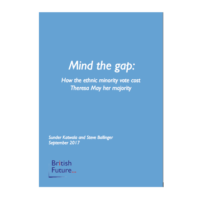 Theresa May’s party would have won an additional 28 seats, securing a majority of 42, if the Conservatives had closed the ‘ethnic minority voting gap’ and secured the same level of support from ethnic minority voters as they did with the public as a whole, according to new research from British Future.
Theresa May’s party would have won an additional 28 seats, securing a majority of 42, if the Conservatives had closed the ‘ethnic minority voting gap’ and secured the same level of support from ethnic minority voters as they did with the public as a whole, according to new research from British Future.
Even if the Conservatives had halved the ethnic vote gap, they would have won an additional 10 seats, taking Theresa May just past the winning post.
The Conservative Party performed half as well with non-white voters as with white voters, according to available polling data on the ethnic minority vote. Bridging that ‘ethnic minority voting gap’ would have secured an additional 600,000 votes. The British Future projections, in the new report ‘Mind the gap: How the ethnic minority vote cost Theresa May her majority,’ distribute these votes according to the ethnic make-up of each constituency, projecting a hypothetical picture of how increased ‘minority appeal’ would have translated into seats. The report finds that:
- In 17 of the 28 seats that Labour took from the Conservatives the ethnic minority vote was critical, with Labour’s lead with ethnic minority voters larger than the overall majority by which they won.
- The failure to appeal to non-white voters also meant the Conservatives fell short in six seats that they would otherwise have taken from Labour.
- The Conservatives could have won an additional five seats from the SNP or LibDems had they extended their appeal to non-white voters.
- The Conservative Party now holds only five of the 75 most diverse parliamentary constituencies in the UK, having held nine in 2015 and 13 in 2010. By 2017, the party had lost more than half of its 15 highest-diversity seats from 2010.
There is a strong pragmatic case for bridging the ‘ethnic minority voting gap,’ as Britain’s growing diversity means the penalty will get higher at each election for parties that fail to reach out to non-white voters. But there is a principled case too: a One Nation party should be able to appeal equally to Britons of every creed and colour.
The report also challenges the Labour Party, despite its strong performance with ethnic minority voters in the 2017 General Election, not to take these votes for granted. Partisan party allegiance is in decline, the authors state, and complacency could backfire – particularly with younger voters who were not even born when Labour built its historic reputation with ethnic minorities, passing the pioneering anti-discrimination legislation of the 1970s. A Labour Party that aspires to govern, the report says, will need to expand its appeal to a broader coalition of voters, including to middle-class, aspirational ethnic minority voters living outside Britain’s biggest cities.
The report offers five key lessons for political parties that seek to broaden their appeal to Britain’s growing ethnic minority electorate:
- Bridge Britain’s identity divides, rather than polarising them – Parties that want to govern Britain will need a broad electoral appeal, reaching those who still feel anxious about the pace of change in multi-ethnic Britain as well as those who welcome the benefits of diversity and migration.
- Strike the right balance on immigration – Ethnic minorities are more likely to feel that there are both economic and cultural benefits from immigration, but have similar views to other voters about the pressures of immigration too. Politicians will need to take a balanced approach, recognising the pressures and the gains.
- Have an integration agenda that is about One nation, not about ‘Them and Us’ – An approach to integration that places all the emphasis on minorities and regards them as part of ‘migrant communities,’ finding their place in the society they were born into, can feel alienating to 2nd and 3rd generation ethnic minority Britons. An ‘everybody’ integration agenda, about common responsibilities of shared citizenship, is long overdue.
- Recognise how playing ‘good minority, bad minority’ might backfire – A ‘One Nation’ party should aspire to win support from across society. Politicians should recognise the risks of narrowly micro-segmenting the ethnic minority electorate.
- Make and offer to younger voters – Parties will need to build a broader appeal that defuses a ‘generation clash’ in politics.
Britain’s growing diversity is a demographic and electoral fact that no political party can afford to ignore. An estimated 10% of the 2017 electorate is from an ethnic minority – somewhat lower than the share of the population as a whole (around 14-15%) due to citizenship, voter registration and age effects, but a pool of 3 million votes all the same. What’s more, that proportion will increase at every election because Britain’s non-white population is young: fewer non-white voters die each year while a greater number reach voting age and join the electorate. This fact poses an obvious challenge to a Conservative Party that only secured a fifth of these votes in 2017.






